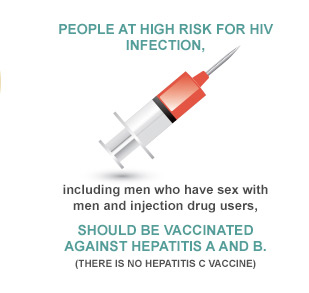What is Hepatitis?
Hepatitis means inflammation of the liver. This condition is often caused by a virus.
In the United States, the most common causes of viral hepatitis are hepatitis A virus (HAV), hepatitis B virus (HBV), and hepatitis C virus (HCV). HBV and HCV are common among people who are at risk for or living with HIV; that’s because these viruses are transmitted in some of the same ways HIV is transmitted—through injection drug use and condomless sex. When someone is infected with both HIV and viral hepatitis, we say that they are “coinfected.”
Viral hepatitis progresses faster and causes more liver-related health problems among people with HIV than among those who do not have HIV. Although drug therapy has extended the life expectancy of people with HIV, liver disease—much of which is related to HCV and HBV—has become a leading cause of non-AIDS-related death among people living with HIV.
This page is about how hepatitis B affects people with HIV. For information about other types of viral hepatitis, see our related pages, Hepatitis A and Hepatitis C.
Hepatitis B and HIV
- About 10% of people living with HIV in the U.S. are coinfected with HBV.
- All people living with HIV should be tested for HBV.
- People living with HIV who are coinfected with HBV are at increased risk for serious, life-threatening health complications. HIV/HBV coinfection can also complicate the management of HIV infection.
- Hepatitis B is preventable with a vaccine and HBV vaccination is recommended for people who are at risk for or living with HIV who have tested negative for HBV.
Hepatitis B is a contagious liver disease that ranges in severity from a mild illness lasting a few weeks to a serious, lifelong illness. It results from infection with HBV.
About 10% of people living with HIV in the U.S. are coinfected with HBV.
You can have HBV without having any symptoms, and sometimes it will clear up naturally without progressing to a chronic infection, leaving you with immunity. People who have chronic HBV infection, however, can develop liver disease, liver failure, or even liver cancer. HBV is the world’s leading cause of chronic liver disease.
Transmission
HBV is a hardy virus that can remain infectious outside the body for over 7 days, even in dried blood. It is transmitted through contact with infectious blood, semen, or other body fluids; sexual contact with an HBV-infected person; sharing of contaminated needles, syringes, or other drug injection equipment (i.e., “works”); and needlesticks or other sharp-instrument injuries. A woman who is infected with HBV can also pass HBV to her newborn.
Testing
There is a test that can detect if you have HBV, even if you have no symptoms. The test result can help determine if you have ever been infected with HBV, and if so, whether you have chronic HBV infection or you have cleared the virus on your own. Your provider can determine whether you would benefit from HBV vaccination. People living with HIV who are coinfected with HBV are at increased risk for serious, life-threatening health complications. HIV/HBV coinfection can also complicate the management of HIV infection. For this reason, HHS’ Guidelines for the Prevention and Treatment of Opportunistic Infections in HIV-Infected Adults and Adolescents, HRSA’s Clinical Guide for HIV/AIDS Care, and the CDC all recommend that all people living with HIV get tested for HBV.
Protecting Yourself from HAV
There is a vaccine that can protect you from HBV. If your hepatitis B test is negative—meaning that you don’t have chronic hepatitis B and you don’t have antibodies against hepatitis B—your healthcare provider will recommend that you get the hepatitis B vaccine to prevent infection. The CDC recommends HBV vaccination for people who are at risk for or living with HIV, including men who have sex with men (MSM); people who inject drugs; household contacts and sex partners of people who have HBV; people with multiple sex partners; anyone with a sexually transmitted infection; people with diabetes; and health care and public safety workers who may be exposed to blood on the job.
Treatment
If your hepatitis B test is positive, your healthcare provider will discuss treatment for this coinfection with you. Treatment for HBV infection involves using antiviral medications, some of which are the same as those that treat HIV. HBV treatment can delay or limit the effects of liver damage. HIV/HBV coinfection can be effectively treated in many people, but treatment is complex. If you have HIV/HBV coinfection, you should look for a healthcare provider with expertise in the management of both infections.
If you have HIV/HBV coinfection, you should also ask your healthcare provider if you need to be immunized against HAV to prevent further infection and liver damage, and ask about other lifestyle changes you may need to make, such as avoiding the use of alcohol, as this can cause additional liver damage. You should also check with your healthcare provider before taking any prescription pills, supplements, or over-the-counter medicines, as these can potentially damage your liver.
Preventing the Spread of HBV to Others
If you are HIV-positive and coinfected with HBV, it is important to remember that the use of latex condoms not only reduces your risk of transmitting HIV and other STDs to sexual partners but reduces the risk of transmitting viral hepatitis infections to others as well. In addition, because HBV is transmitted from infected person to uninfected person through blood and bodily fluids, be sure to avoid sharing needles, razors, and toothbrushes so that you do not pass HBV to others.
Learn More
For more information about HBV, see CDC’s Hepatitis B Information for the Public.
Also, CDC offers 5-minute online Hepatitis Risk Assessment Tool. This tool allows people to answer questions privately and get tailored recommendations based on CDC’s guidelines to discuss with their doctor.
Related Topics on AIDS.gov
Additional Resources
Last revised: 06/30/2015



